
Christmas Gift Shopping Habits Survey Results 2023
82% of UK consumers would class themselves as great gift givers and with 80% also saying that they prefer to give gifts than receive them, it seems that we really are a nation of generous spirit. However, with recent data suggesting that over half of shoppers will spend less than usual on gifts in 2023 due to the cost of living crisis, could we expect to see fewer presents under the tree this year?
We surveyed over 1,000 UK consumers who will be buying Christmas gifts this year to find out about how they shop, their festive spending habits, their best ever presents and what happens to the ones that aren’t so great. We also asked their views on sustainability, personalised gifts, small businesses and second-hand shopping, and how these opinions inform their gift buying decisions.
Emily Carr, co-founder of personalised gift company Create Gift Love, says “we know that the Christmas period can be a stressful time for shoppers, with gift shopping being just one of the many things you have to complete before the big day, and with the added financial pressure of the cost of living crisis, this year is expected to be particularly challenging. The survey showed that women in particular are shouldering the burden of Christmas organisation more often than not, which I know I can resonate with, both on a personal level being a mother of two young children, and from a business perspective, knowing that we have a 70% female customer base who turn to us for Christmas gift inspiration. It was interesting to find out from this new data just how much the average UK gift shopper is spending and where their pain points are when finding presents.
“However, despite the challenges, we are definitely a nation of gift givers! It was heartening to see how many – an overwhelming majority – prefer to give presents than receive them, emphasising the joy that gift giving brings. From running a personalised gift company for over a decade we know that gift giving is not just about the physical objects, it’s the time spent picking them out, the thought that’s been poured into choosing something your loved ones will cherish, and the anticipation of their reaction. That’s why we do what we do at Create Gift Love, and it’s exciting to see that so many shoppers feel the same way.
“This Christmas we will be encouraging customers to shop in a more thoughtful way, buying fewer gifts but making them count and helping them to find presents that are really meaningful to their loved ones. The survey highlighted that many shoppers in the UK have a desire to shop more consciously, with an interest in small businesses, sustainable products and even second-hand gifts. This growing trend, accompanied by the need to save money, suggests that many shoppers may begin to adopt the “fewer but better” attitude. By choosing one really thoughtful gift for each person on your list instead of feeling the pressure to go OTT, we can save waste, save money and ultimately make our loved ones feel more appreciated, which is what gift giving is all about, after all.”
Key Data
-
The majority of Christmas shoppers in the UK buy gifts for 6-10 people each year and spend an average of £30 - £50 per person.
-
86.5% of women surveyed say they take on the responsibility of gift shopping on behalf of their household compared to 65.4% of male respondents.
-
88% of us struggle to come up with gift ideas at least sometimes, with partners being most commonly named the hardest to buy for.
-
Over half of us will spend less than usual on Christmas gifts this year due to the cost of living crisis with many planning to save money by buying fewer gifts per person and choosing less expensive items.
-
80% of UK consumers would class themselves as good gift shoppers, however the vast majority of us admit that we have received dud gifts in the past with only 17% saying they have never received a gift they didn’t like.
-
The majority of UK consumers prefer to give gifts than receive them.
-
Only 28% of people in the UK have bought second hand gifts for others, yet 73% reveal that they would be happy to receive them.
Highlights of our survey findings include:
General gift buying habits
-
How many people will you be buying Christmas gifts for this year?
-
Are you responsible for most of the gift shopping in your household?
-
Do you struggle to come up with gift ideas for other people?
Budget and spending considerations
-
On average, how much do you spend on Christmas gifts per person?
-
Will the current cost of living crisis impact how much you spend on Christmas gifts this year?
Thoughts on unwanted gifts
-
On average, how often do you receive Christmas gifts you don't like?
-
If someone gave you a gift you didn't like, would you tell them?
Attitudes to second-hand shopping
Factors that influence purchasing decisions
How many people will you be buying Christmas gifts for this year?
The majority of Christmas shoppers (over 78%) will be buying gifts for up to 10 people this year. 37.76% of respondents to our survey said they will be gift shopping for between 1-5 people, and 40.86% will be buying gifts for 6-10 others.
15.68% said they will be buying gifts for 11-15 people while 3.3% will shop for 16-20, and only 2.4% buy gifts for more than 20 people.
The age and gender of respondents had very little impact on the result, however the survey did show that men were more likely to answer ‘1-5’ by a small margin.
Note, our survey group only included UK residents who will be buying Christmas gifts in 2023. Those who answered ‘I won’t be buying any gifts this year’ did not qualify for the survey.
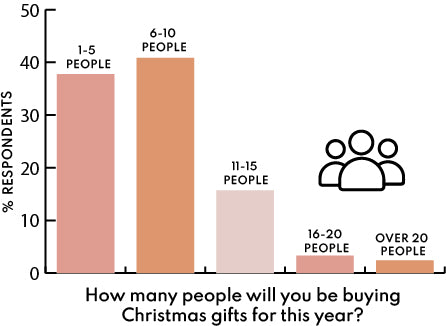
Are you responsible for most of the gift shopping in your household?
When asked who was responsible for most of the gift shopping in their household, 77.42% of respondents said they were the main gift shopper, while 18.78% said that the responsibility was shared equally. Only 3.8% said they were not the main shopper (however it is worth noting that people who do not buy Christmas presents did not qualify for the survey, therefore those with zero responsibility are not included here).
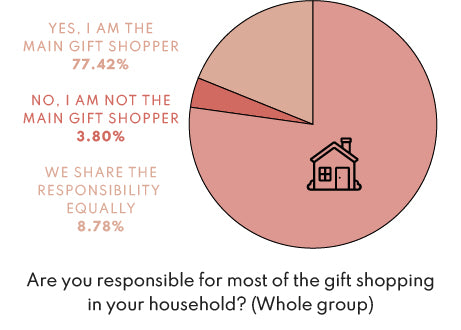
Our survey found that women were more likely to take on the responsibility of gift shopping than men. 86.51% of the women asked said they were the main shopper, compared to 65.35% of the men asked.
We also found that men were more likely to say that the responsibility of gift shopping was shared equally in their household (27.91% of men compared to 11.91% of women).
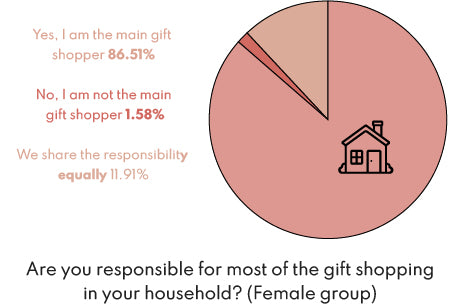
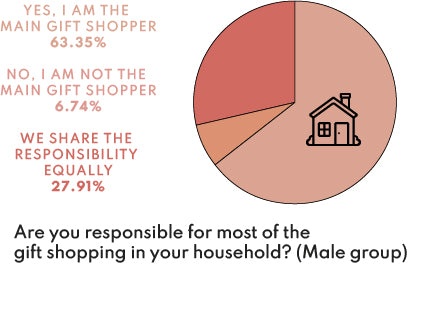
When do you start your Christmas shopping?
According to our survey, September is when the Christmas shopping season starts in the UK. Despite many of us complaining to friends when we see Christmas stock on the high street when summer has barely ended, almost half of us (46.75%) start our Christmas shopping three months before the festive celebration.
31.77% say they start their Christmas shopping one month before, and just 3.3% wait until the week before Christmas to begin their gift shopping.
There are some more organised shoppers amongst us though: 7.69% of UK gift shoppers start their Christmas shopping 6 months in advance, and 6.49% spread the cost and shop here and there throughout the year.
The survey also found that the 18-24 age group were more likely to start their Christmas shopping in December, as were male shoppers (of all ages).
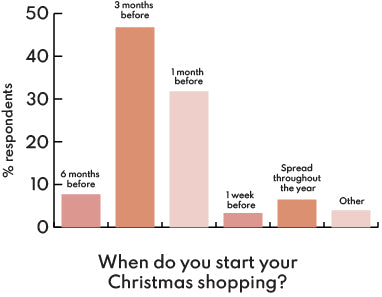
Do you struggle to come up with gift ideas for other people?
88% of us struggle to come up with gift ideas for other people at least sometimes. For 45.35% of gift shoppers, coming up with ideas is always a struggle, while for 42.96% it depends on the person they are buying for.
Only 11.69% of respondents said they do not struggle with gift inspiration.

Who do you find it hardest to buy gifts for?
Partners were most commonly named as the hardest to buy gifts for (23.37% of respondents answered ‘partner’). Our parents were the next most common, with 17.68% naming Dad as the trickiest and 12.89% saying Mum.
The survey found that younger groups (18-24 and 25-34) found dads hardest, followed by partners.
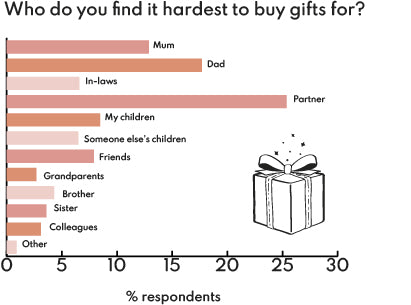
Do you prefer to give presents or receive them?
80.32% of respondents prefer to give presents than receive them. This was the most common answer among all age and gender groups, showing that we are truly a nation of givers.
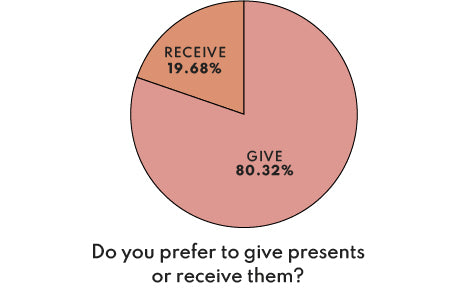
Who do you typically spend the most on?
The majority of gift shoppers spend the most on their children at Christmas, with 40.46% putting their kids at the top of the list. ‘Partner’ was the second most common answer, at 29.57%.
Looking at parents, more respondents answered ‘mum’ than ‘dad’ (12.79% vs 2.3%) and the 18-24 year old group were most likely to spend most on Mum.
According to the survey, 5.39% of shoppers keep things even and try to spend the same amount on everyone. But just how much is the average gift shopper spending…
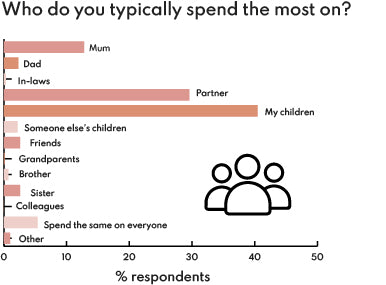
On average, how much do you spend on Christmas gifts per person?
Respondents were asked the average amount they spend on Christmas gifts per person from the following spend brackets: under £10, £10 - £20, £20 - £30, £30 - £50, £75 - £100, £100 - £300 and £300+. The results were fairly evenly distributed across all brackets, however the most common were £20 - £30 (21.78%) and £30 - £50 (27.47%), suggesting that the overall average spend is approximately £30 per person.
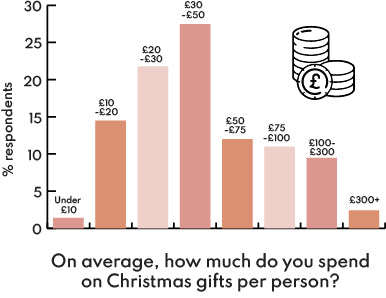
Will the current cost of living crisis impact how much you spend on Christmas gifts this year?
Over half of UK gift shoppers will be spending less this Christmas due to the cost of living crisis. 53.25% said that they would be cutting their spending compared to previous years, and 38.96% said they would be spending the same as usual. Just 7.79% said they would be spending more than normal this year, showing how much of an impact the UK’s financial situation has had on the average shopper.

What will you be doing to save money on Christmas gifts?
We then asked those who plan to spend less what they will be doing to save money on Christmas gifts this year.
The most popular response was to buy less expensive gifts (i.e. own brand products instead of designer labels) with 61.35% of those asked planning to cut costs this way. 47.47% also plan to buy each person fewer presents (i.e. one main gift each instead of several smaller ones) and another common answer was to simply buy for fewer people this year.
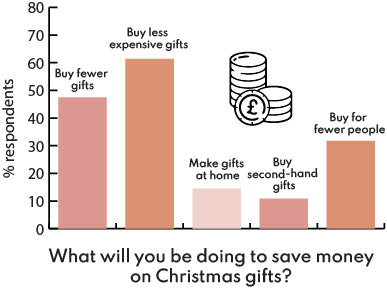
Would you consider yourself to be a "good" gift shopper?
82.82% of respondents consider themselves to be good gift shoppers, saying that they think they give great gifts.
We also found that female respondents were more confident in their gift shopping abilities than male respondents, with 86% female respondents identifying as good gift shoppers compared to 78.6% male.
These results are interesting to bear in mind as we move onto our next set of questions, surrounding the less favourable gifts we receive.
On average, how often do you receive Christmas gifts you don't like?
In contrast to the above, over 82% of respondents say they have received Christmas gifts they don’t like in the past, with over 10% saying they receive a gift they dislike most years.
8.69% say that they have only received a gift they disliked once, and 17.58% have never been given a bad Christmas gift.
The most common response was “it’s happened a few times” which was given by 58.34% of respondents.
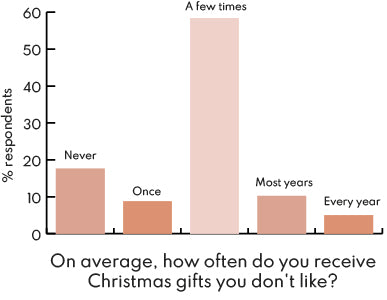
What do you typically do with unwanted gifts?
When we receive gifts we don’t like, the majority of us will usually either keep them (37%) or donate them (37%). The next most common answer was to ‘re-gift them’, with 24.38% of respondents saying they do this.
12.29% of the respondents had an entrepreneurial streak, saying that they were likely to sell their unwanted gifts, and almost 10% will bin their unwanted gifts.
Note, respondents were able to select multiple options.
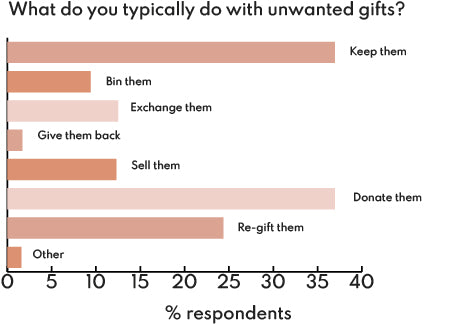
If someone gave you a gift you didn't like, would you tell them?
Our survey has shown that people in the UK are unlikely to be honest about the Christmas gifts they don’t like. Despite the majority of respondents saying that they had received dud gifts in the past, only 4.3% of respondents would be honest with a loved one if they received a gift they didn’t like.
26.17% said it would depend on who gave the gift to them and 65.53% simply said they would not tell the person.
Do you ever buy second-hand items for yourself?
67% of UK shoppers buy second-hand items for themselves, such as clothes, homeware, books and entertainment.
Second-hand shopping is a ‘frequent’ activity for 25.67% of us, while 41.66% shop second-hand ‘occasionally’. 17.18% said they buy second-hand items ‘rarely’ and 15.48% do not buy second-hand items at all.
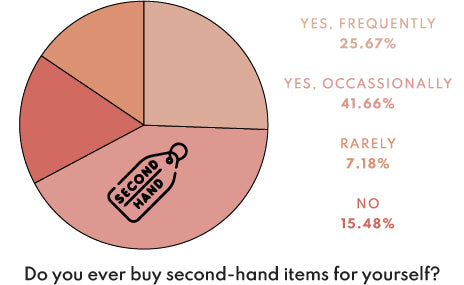
Why do you shop second-hand?
The main reason people shop second-hand is to save money, according to 67.49% of the pro- second-hand shoppers in our survey.
Answers of ‘to support charities’ and ‘to find unique items’ were each given by 43% of respondents and 23% said they shop second-hand for environmental reasons.
We then asked the anti- second hand group for their reasons against second-hand shopping.
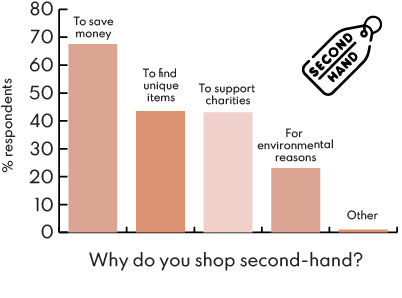
Why don't you buy second-hand items?
The main reasons given for not buying second-hand items were that respondents ‘prefer new’ (59.35%) and ‘don’t like the idea of using someone else’s things’ (47.74%).
10.32% said ‘[they] can afford to buy everything new’ and 7.74% said that they couldn’t get the things they want from second-hand sources.
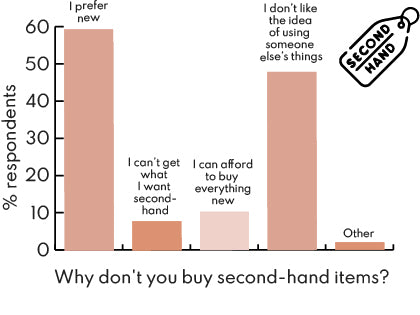
Have you ever bought second-hand items to give as gifts?
Despite the fact that almost 85% of us have bought ourselves second-hand items in the past, the majority of surveyed people would not be open to the idea of giving second-hand items as gifts.
When asked ‘have you ever bought second-hand items to give as gifts?’, only 28.47% of respondents answered that they had. 32.27% said that they had not but would be open to the idea, while the majority (39.26%) said that they had not and would not give second-hand gifts.
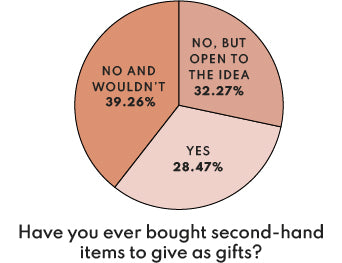
Why wouldn't you give a second-hand gift?
We then asked those respondents (against giving second-hand gifts) what was putting them off and the main reason (given by 49.87%) was the perception that ‘[other] people might not like the idea of second-hand items’.
Other factors putting shoppers off the idea were ‘[second-hand items are] not special enough for a gift’ (35.37%), ‘it will look cheap’ (32.57%) and ‘people might be judgemental’ (30.53%).
The above findings point to the idea that there is a stigma around preloved products when it comes to gifting. Many of us hold the assumption that other people in our lives will not appreciate a second-hand gift in the same way they would enjoy something brand new. However, the results of our next question may go some way to disprove this.
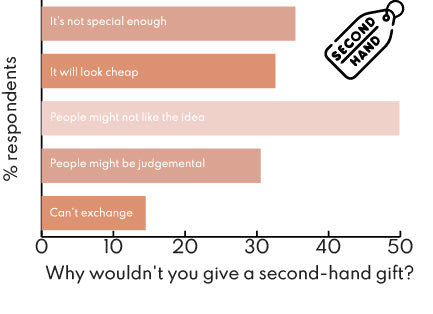
Would you be happy to receive a second-hand gift?
73% of people said that they would be happy to receive a second-hand gift.
In fact, even 42.49% of those who said they were against buying second-hand gifts for others answered that they would happily receive a second-hand gift themselves.
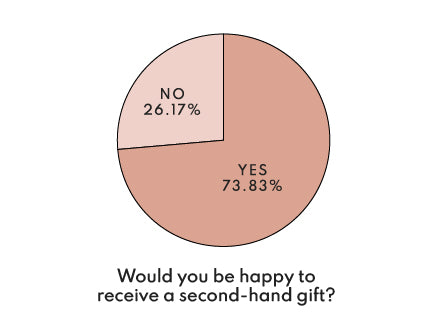
We also asked participants for their opinions on a number of factors that may influence their buying decisions, including sustainability, UK manufacture and supporting small businesses. While attitudes to each did differ, the general consensus was that these factors are important to the majority of shoppers and in most scenarios, price appears to be the barrier. Here is a summary of our findings:
Regarding sustainability…
-
59.54% feel that buying sustainably made/sourced products is important to them
-
47.56% would be willing to pay more for sustainably made/sourced products
-
77.13% would prefer to buy a sustainably made/sourced product if money was no object
Regarding UK manufacture…
-
54.94% feel that buying UK made products is important to them
-
44.16% would be willing to pay more for a UK made product
-
68.44% would prefer to buy a UK made product if money was no object
Regarding independent and small businesses…
-
65.73% feel that buying from small independent businesses is important to them
-
57.94% would be willing to pay more for products from a small independent business
-
74.33% would prefer to buy from a small independent business if money was no object
Access this survey's raw data in Excel format
|
Poll Title: |
Christmas Gift Shopping Habits Survey 2023 |
|
Poll Objective: |
To gain insights into UK gift shoppers preferences and spending habits when buying Christmas gifts |
|
Conducted: |
23rd August 2023 |
|
All Respondents: |
1,123 randomly sampled people in the UK |
|
Qualified Respondents: |
1,001 |
|
Screening Question: |
How many people will you be buying Christmas gifts for this year? 1-5 people 6-10 people 11-15 people 16-20 people Over 20 people Answers of 'I won't be buying any gifts this year' did not qualify |
|
Respondent Age: |
Aged 18+ |
|
Respondent Location: |
UK |
|
Author: |
Create Gift Love |
|
Source Website: |
|
|
Platform: |
Pollfish |
|
Methodology: |
A randomised sample of 1,123 throughout the UK’s 67,796,130 population (worldometer) of which 1,001 respondents qualified. 95% confidence. 4% margin of error. |
|
Copyright |
© 2023 Create Gift Love Limited |
|
Media Contact: |
Georgia Stephenson 01425 482944 |
|
Credit Requirement: |
You must credit Create Gift Love when republishing any part of these statistics. If you have any media enquiries, or require an accessible unlocked version of this excel file, please in the first instance email georgia@creategiftlove.co.uk |
|
Open License Information: |
https://www.creategiftlove.co.uk/pages/syndication |
|
Source URL: |
https://www.creategiftlove.co.uk/blogs/research/christmas-gift-shopper-habits-survey-results-2023 |

